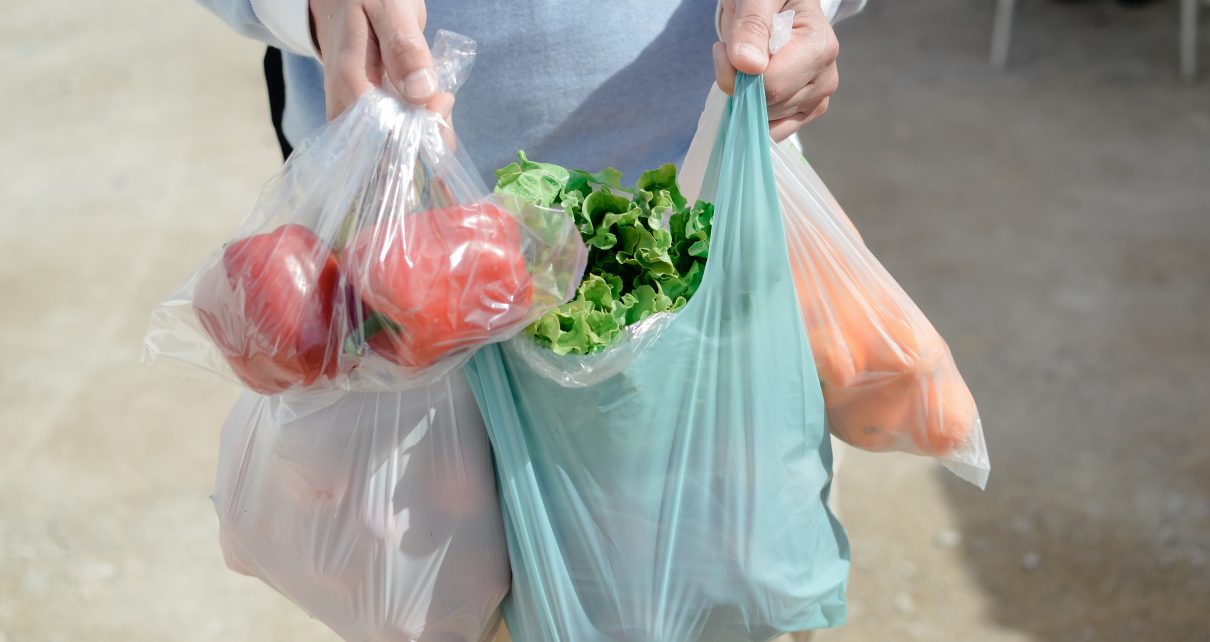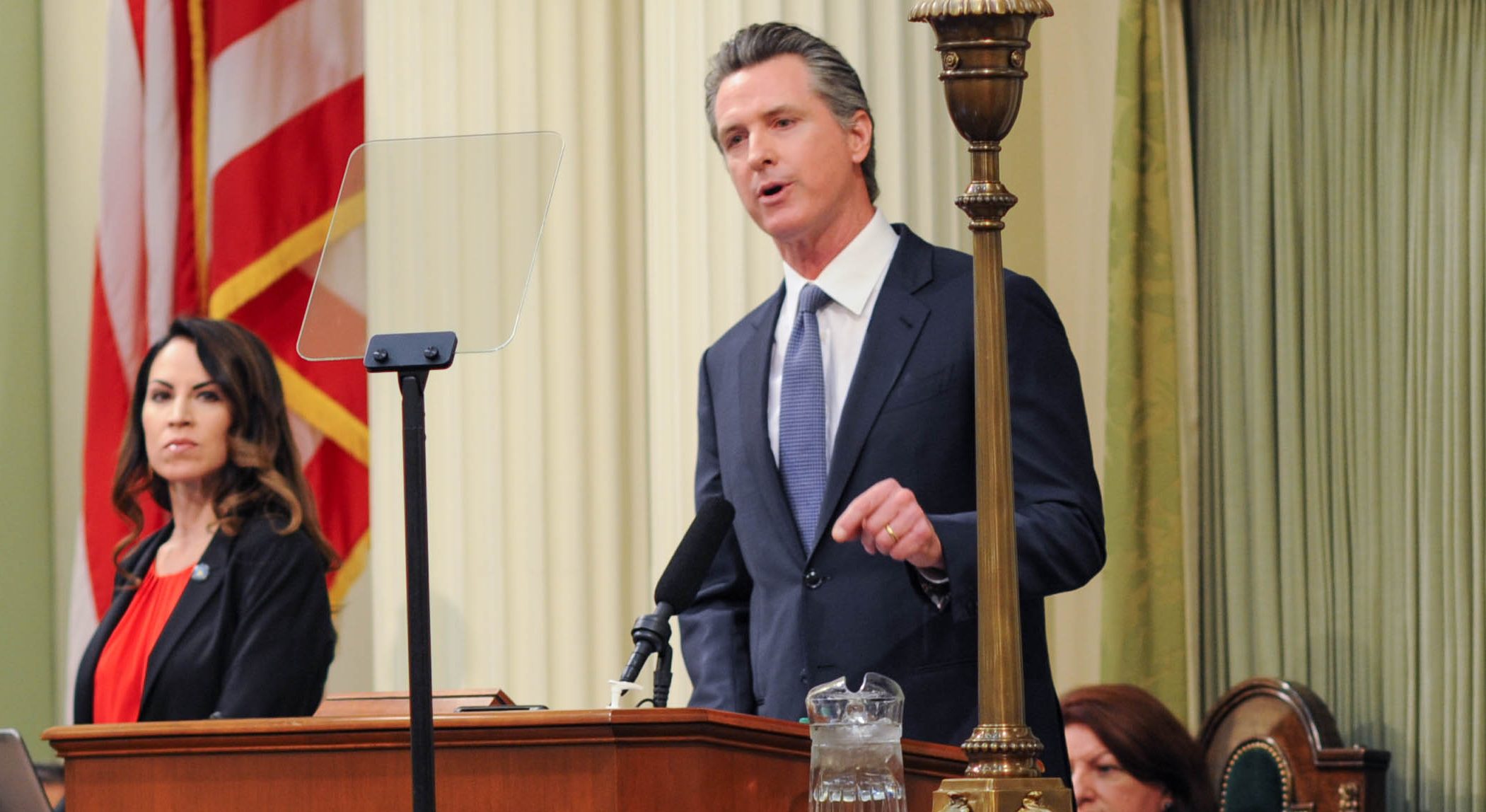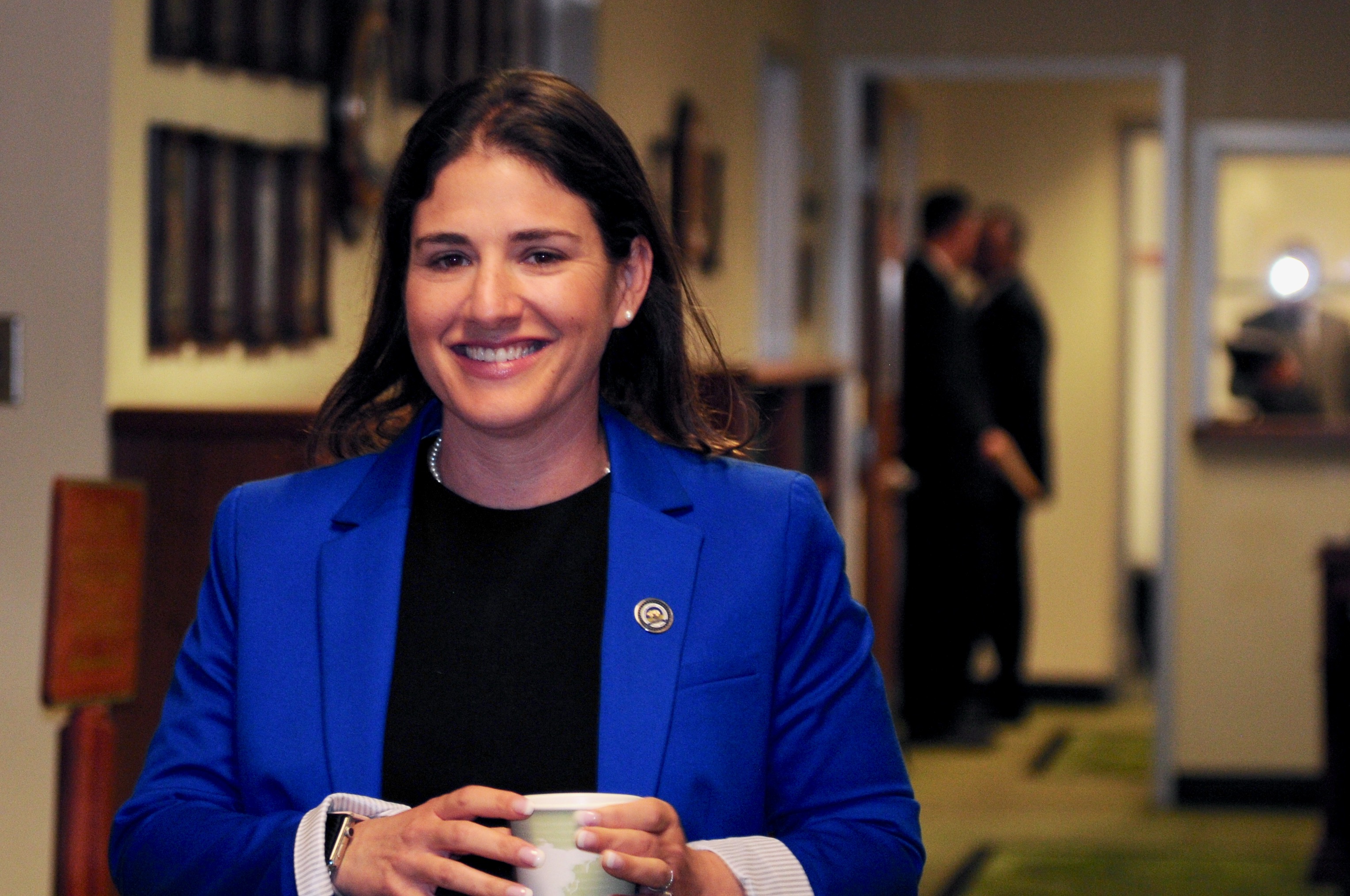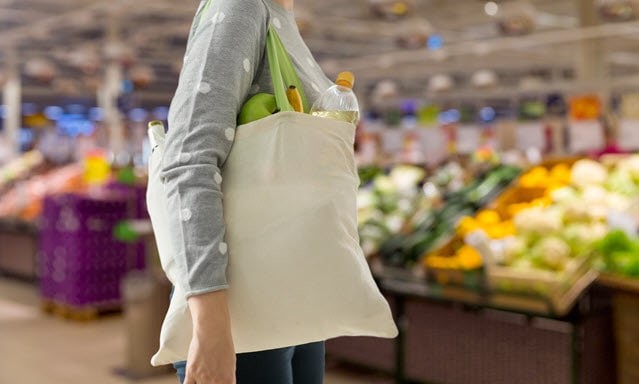
Person holding groceries in plastic bags. (ARIMAG/Shutterstock)
The Plastic Bag Ban Fraud is Back
Enforcing litter laws would go much further to helping the environment
By Katy Grimes, February 9, 2024 8:25 am
Reduce. Reuse. Recycle. We hear this daily and see those orders nearly everywhere. Paper or plastic? Separate out your wet garbage and put it in another recyclable food bin. Separate bottles and cans. Compost.
Yet none of this has reduced landfills. And recyclers in California are going broke. According to CalRecycle, statewide recycling rate dropped significantly from 2020.
CalRecycle reports legislation signed by Gov. Newsom requires all packaging be recyclable or compostable by 2032, with 65% of it recycled by 2032, shifting the burden from the consumer to the packaging producer. Expect prices to go up – again.
And now comes more legislation to ban plastic bags. But banning plastic grocery bags does not reduce disposal and recycling costs, studies over the last 9 years have shown.
One would think that policymakers and legislators might have figured out by now that consumers will decide on which kind of shopping bag to use, if any, for their purchases. Instead, bag tax pushers from coast to coast want government to decide what, how and when shopping bags can be used – or not at all.
Two new bills propose to ban all plastic bags from grocery stores and other stores were unveiled on Thursday, potentially marking the complete end of all plastic bags in stores, the Globe reported.
Assembly Bill 2236 and Senate Bill 1053, authored by Assemblywoman Rebecca Bauer-Kahan (D-Orinda) and Senator Catherine Blakespear (D-Encinitas), proposes to ban any kind of plastic bag at food stores and convenience stores. Both bills will act as an expansion of SB 270, a 2014 bill that was approved of by voters in 2016 as Proposition 67, which banned all “one time use” plastic bags, and only allowed thicker plastic bags to be purchased in stores.
However, those thicker plastic bags are now also bad, and apparently now considered “single-use” – lawmakers and the environmental lobby claim, “Single-use plastic bags are among the most insidious types of pollution and one of the most common items found on our beaches and waterways.”
Nine years ago in 2014, SB 270 by State Sen. Alex Padilla (D-Pacoima), and co-authored by Sen. President pro Tem Kevin de León (D-Los Angeles), and Sen. Ricardo Lara, (D-Los Angeles), banned the recyclable plastic bags and replaced them with heavier plastic bags, five times thicker. It is unclear how a significantly thicker plastic bag is better for the environment, other than the fact they can be used many more times than the flimsy plastic bags.
In 2009, when plastic bag bans were all the rage in cities around the country, and paper bags were considered tree killers, I reported in the Washington Examiner:
San Francisco’s ban on plastic bags has not provided the environmental results it expected. Anticipated environmental gains resulting from the ban were “nonexistent at best,” and the ban likely did more harm than good. Consumers just switched from single plastic to double paper bags; few consumers remembered reusable totes, which caused delays in checkout; and recycling bins were hard to find or nonexistent.
Additionally, A recent microbiological study found unacceptably high levels of bacterial yeast, mold and fecal bacteria counts reside in the reusable bags (nastysack.com).
The study found that 64 percent of the reusable bags tested were contaminated with some level of bacteria, and close to 30 percent had elevated bacterial counts higher than what’s considered safe for drinking water. Further, 40 percent of the bags had yeast or mold, and some of the bags had an unacceptable presence of fecal intestinal bacteria when there should have been zero.
They are only now realizing that their low-carbon footprint bag is also filled with nasty bacteria if not washed regularly. A recent microbiological study found unacceptably high levels of bacterial yeast, mold and fecal bacteria counts reside in the reusable bags (nastysack.com).
Assemblywoman Bauer-Kahan and Senator Blakespear claim studies found that most Californians were either not recycling those bags or were still using the thicker bags as one time only bags, despite being designed to be used multiple times. According to one state study cited by Blakespear, the amount of plastic shopping bags trashed per person grew from 8 pounds per year in 2014 to 11 pounds per year in 2021, despite the massive law change. Both lawmakers claim plastic bags are still causing environmental damage, and that a total ban is the only way to stop it. Some coastal cleanup surveys also found that volunteers have collected over 300,000 plastic grocery bags in the last three decades.
Only there are no links to those supposed studies. They also still claim many people dispose of plastic bags after just one or a few uses. Yet most people tell you they use plastic bags multiple times, for myriad uses.
A report from Ocean Conservancy claims many people dispose of plastic bags, after just one or a few uses. And in the report they say the AG Rob Bonta and the California Department of Justice have sent letters to seven top plastic bag manufacturers in the state asking them to substantiate claims that their bags are recyclable. This sounds like the real motive behind Assemblywoman Bauer-Kahan’s and Senator Blakespear’s bills.
I remember when plastic bags were foisted on shoppers because cutting down trees for paper was bad. The bags were sold to the public as 100 percent reusable and recyclable.
The 2014 bag ban bill allowed grocers to charge a minimum of 10 cents each for paper and thicker plastic bags, and pocket the money. While a fee of $.10 per bag does not sound like much, it harms low-income households, and the working poor, more than others. A cleaner environment is a valuable goal. The question is whether solutions that impose more challenging costs on the working poor, with debatable environment outcomes, are the best way to proceed.
The legislation ignored the fact that a huge portion of grocery and retail plastic bags are reused as lunch sacks, garbage pail liners, pet-waste disposal bags, lunch bags, trash bags, dispose of kitchen grease, dispose of dirty diapers, hold wet clothes, and a myriad of other uses. These secondary uses of plastic grocery bags are beneficial to the environment in that it prevents the manufacture and purchase of another plastic bag. I wrap my holiday decorations in the bags, before I box them up, year after year.
According to a study by the National Center for Policy Analysis, an examination of the bag bans and budgets for litter collection and waste disposal in San Francisco, San Jose, the City and County of Los Angeles, Washington, D.C., and Brownsville and Austin, Texas, showed no evidence of a reduction in costs attributable to reduced use of plastic bags.
The environmental myths, exaggerations and misinformation that have been spread about plastic bags have led many to believe that plastic bags kill 100,000 sea mammals and one million seabirds each year. Each of the bill authors have used this emotional argument and trotted out the much-used photo of a turtle with plastic bag in its mouth as proof. Not only is the story about the turtle not true, The London Times exposed the dead sea mammals and seabirds as a myth based on a typographical error. The original report mentioned discarded fishing tackle including fishing nets, not plastic bags. David Santillo, a marine biologist at Greenpeace, told The Times: “It’s very unlikely that many animals are killed by plastic bags. The evidence shows just the opposite.”
Plastic bag manufacturers argue that the litter problem is caused by careless people. Enforcing litter laws would go much further to helping the environment.
- California Elections Code Book Published - July 26, 2024
- California Supreme Court Ends Legal Snafu Over Gig Drivers – Upholds Prop. 22 - July 26, 2024
- Sen. Kamala Harris Claimed Ignorance Over Long-time Employee Sex Abuse Case - July 25, 2024





As Katy Grimes pointed out, plastic bags were originally foisted on shoppers because cutting down trees for paper was bad and the bags were sold to the public as 100 percent reusable and recyclable. Enforcing litter laws would go much further to helping the environment.
Who are the two Democrats in the legislature that are pushing these bills to ban plastic shopping bags?
Democrat Assemblywoman Rebecca Bauer-Kahan represents the 16th State Assembly district which is the most affluent State Assembly district consisting of the suburbs east of the Berkeley Hills and most of Walnut Creek. She grew up in the wealthy community of Portola Valley where the median income is well over $200,000. She’s another radical leftist lawyer and a member of the California Legislative Jewish Caucus who didn’t issue a peep when pro-Hamas thugs stormed the California State Capitol and shut down the Assembly session. Instead she wants to ban plastic bags. It’s something that the oppressively corrupt Kahzarian mafia would do?
Democrat Sen. Catherine Blakespear is another radical leftist lawyer who grew up privileged and pampered in the upscale beach community of Encinitas which has been repeatedly sued over policies that aimed at undermining state affordable housing laws. Living in a large mansion on a six acre estate in Encinitas, no doubt Blakespear has household help that does the shopping for her and she hasn’t had to schlep any grocery bags for years? She’s another wealthy coastal Democrat who is completely out of touch with the struggles of average Californians?
Law degrees are now available as the prize in cereal coxes.
Serial
AGREE
Katy Grimes is exactly right, of course (for the millionth time) —- enforce litter laws. See dramatic results!
And take THAT, Asm Rebecca Kahn-Bauer & Co. Nine years of STUDIES: “….Banning plastic grocery bags does not reduce disposal and recycling costs, studies over the last 9 years have shown.”
Also love what she wrote for the Washington Examiner —– in 2009(!), yet.
Thanks also for pointing out that the claim of “one-use” is obviously B.S. and for listing all of the many many many ways plastic grocery bags have become useful and how they are actually re-used multiple times. Take them away and you have people buying plastic bags in a giant roll to replace them so WHAT have you accomplished?
Nothing. AS USUAL.
These legislators had better watch their step because my constantly-increasing edginess due in large part to being annoyed by THEM non-stop might make me repeat here my “dead rat in the reuseable bag” story, which rat was discovered by a grocery store bagger who was just trying to do her job and get through the day, poor thing. It completely freaked her out, producing blood-curdling screams and general hysteria.
So okay, just keep wasting our time, energy, and money, and irritating our last nerve, legislators, if you must. It won’t end well.
…..And while we’re at it, consider casting a vote for Republican candidate Joseph Rubay for State Assembly, 16th District, Rebecca Kahn-Bauer’s challenger in the upcoming primary.
https://joerubay.nationbuilder.com/
“Some coastal cleanup surveys also found that volunteers have collected over 300,000 plastic grocery bags in the last three decades.”
That isn’t a whole hell of a lot. Run the numbers, and you’ll find that adds up to 27 bags per day in a state of 40,000,000 people. California is 156,000 square miles, 27 bags is nothing. But for that, everybody needs to be punished.
how does banning plastic bags ” punish” anyone!! 😂
Over the last few years California has lost over 1 million generally law-abiding citizens that have paid their taxes and disposed of their plastic bags appropriately. The segments of the population that have been growing are the homeless (who don’t pay taxes and do not dispose of many things properly) and secondly illegal immigrants who may not understand the customers and laws of our State. What did they expect would happen to trash? This is just like the gun debate. Instead of focusing on the root cause issue (criminals) take things away from the law abiding and do not address the real reasons for the problems. Therefore, the problem never gets solved, and more people flee the state. My last comment on this bag issue is the consequence of inferior packaging being used to package our food. This will shorten the shelf life of the product and could lead to contamination issues. This inferior packaging will continue to drive up the cost of food. I believe that these folks know this but are hiding behind all the trash. These are truly cruel people.
Poop bags cost money so many homeless were using the plastic bags from grocery stores. Since the original free ones are no longer available, their only option is to poop on the street and let someone else scrape it off the concrete. Brilliant.
If it costs you money or becomes an inconvenience for you is the only reason you are against it. elimination of plastic products is only a problem for people not anything else but people!!!!!
How long was it pounded into our heads that plastic bags “harmed fishes in the sea” or something to that effect. But the minute the dreaded COVID arose, cashiers behind their plastic face masks and shield walls were recoiling as the reusable bag was placed on the grocery belt. I will never forget the first time a cashier at Albertsons literally backed away from the cloth bag, wrinkling her nose while telling me to remove it, spraying the belt and putting the groceries in a FREE plastic bag. I loudly said “0h, it’s now ok to kill fish” she was not amused.
It’s all such an expensive “laughable” political farce recycled and over again.
With all the problems that Californians face on a daily basis, plastic bags isn’t one of them! Assemblywoman Bauer-Kahan and Senator Blakespear have nothing better to do than to act like annoying rich Democrat Karens.
Whenever I go shopping now, I refuse any bags, cart everything to my car and then leave the cart in the parking lot. Retailers now have to employ someone to round up carts in the parking lot and they don’t get to pocket a minimum of 10 cents for each bag purchased.
Whenever Dems start pontificating about the environment, get ready to feel the pain in your wallet. It’s always about catering to some deep pocketed campaign donor. My mother and I don’t have a car, so we use grocery delivery frequently. That means we get stiffed for the bag fee, and for us, the bags aren’t reusable, at least not as grocery bags. On the rare occasions when we walk to the store, we have several high quality insulated totes and a folding wagon to take with us. We have used the bags for everything from garbage can liners to garden ties and packing material. I’ve even used them to make things like small craft boxes (they’re thermosetting plastic – it’s easy to build up fairly thick sheets by ironing them together). So no, I don’t believe people are just throwing them away. However, we have so many of the damned things squirreled away that we’ve finally had to start throwing them in the trash. So, rather than preventing anything, these lack-wits are creating the problems they claim they’re trying to fix.
John Dunlap, I’m intrigued to hear that you’ve made “small craft boxes” out of the plastic grocery bags. That’s a new one! — hadn’t heard of it before. Wish we could see them.
Ian Frasier, who put the eclectic in eclectic, had an article in The New Yorker some years back called, “Bags in Trees.”
it was about his supposed self-appointed goal of removing bags caught in NYC’s trees. he created his own long grabbing stick, and would respond like gangbusters toward any report he received of a bag in a tree.
funny stuff.
A bagger recently asked me why I remove the brown paper bag handles.
I replied, it reminds me not to use them.
HA HA